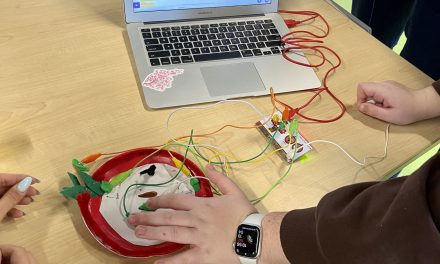I was a first year teacher writing on the chalkboard, simultaneously trying to keep an eye on a room of rowdy secondary 2 students. Suddenly, I heard the words that always make me shudder. “Sir, you spelled a word wrong”. The implication of this phrase is that I, the teacher may not be all-knowing; a fact I was trying to keep hidden until later in the year.
The word in question was learned and my student, a young man of Jamaican heritage, shook my confidence by telling me the correct spelling was “learnt”. Standing in front of 20 students, I was unsure what to do. On one hand, I was fairly confident I spelled learned that way for my whole life. But on the other hand, “learnt” looked strangely correct. Needless to say, the whole issue was dropped when I asked him to look it up in one of our dusty dictionaries.
But I was shaken. After class, I looked up the word and learned/learnt that both spellings are correct. The British use learnt and Americans, learned. Being Canadian, we were free to vacillate between the two.
I tell you this story to underline how authentic experiences cement knowledge and competency. I certainly won’t forget what I learned that day.
Reflecting on that experience got me thinking: in what ways can teachers allow students to have authentic writing experiences, where student work culminates into something that is actually read by people other than just their teacher? If students are writing for an authentic audience, will it increase engagement? Will it change the way they write?
There are two Quebec examples of students writing in English for an authentic audience that have recently caught my eye. Secondary 1 and 2 students at Metis Beach school were given the opportunity to produce a special edition of the Heritage-Lower St Lawrence newsletter. HLSL is a community organization dedicated to serving the English population of their region. I invite you to click on the link and observe the quality of student writing. Highlights include a history of the school and community, an article about bullying and a feature on a class project inspired by the “freedom writers”. It quickly becomes obvious that the students worked hard to write, revise and rewrite compelling and clear articles because they knew their words would be read by the community and beyond. Their teacher, Erin Ross, said her motivation in setting up this opportunity for her students was feeling that it was ”important to have my students have a new learning opportunity in their English class. It is all about the process and showing them that they have a voice.”
I spoke to Melanie Leblanc, the Executive Director of Heritage Lower St Lawrence and she raved about the student-produced newsletter for her organization. She said members “loved knowing what was going on in the school” and noted that since the newsletter was published, the community has an “increased sense of belonging to the school”.
A second example of authentic writing comes from the infamous GrEAU project. GrEAU is a hydroponic based agricultural business founded and run by a group of students from Mecatina School, located in La Tabatiere (a village on the Lower North Shore of Quebec) The project is a sight to behold, in part because of the authentic need the business is fulfilling along with the strong marketing and communications website.
The students involved in the project worked collaboratively to develop a very clear website to share information about how the garden grows along with recipes to get the most out of the fresh produce. The students also had numerous opportunities to be interviewed on CBC radio and Radio Canada communicating clearly in English and French.
I spoke to Ben Collier, one of the founding members and he agreed that collaboratively developing the website allowed him to learn how to present scientific findings and better understand how to communicate what was accomplished. I asked Ben about the editing process and he laughed, remembering how in normal school projects he did not always proofread assignments before handing them in. But with the GrEAU project there was no leniency for errors, the group wanted to make sure everything was perfect.
These two examples show the potential of developing authentic writing opportunities with students. If you are inspired to co-develop opportunities for students in your own schools, please share the results.
If you want to learn more about authentic writing contexts for students, I encourage you to check out a new resource site from the MELS called Literacy Today QC. It includes positive evidence of integrating authentic contexts in your curriculum and examples of authentic classroom activities.
Follow me on twitter @ELA_LEARN







Thanks Ben. Interesting article. Brought back good memories of when I helped students publish various “student voice” magazines in Kanesatake, Joliette and Ormstown. Miss those days, the students wrote from the heart and really enjoyed selling their work for 25 cents in the hallways! Thing is… only a few wrote. At LearnRecit summit last month Tracy Rosen really struck a cord with me when she talked more about needing to help students to find a reason, a passionate desire to write and share. That the writing being actually read in public wasn’t enough. The examples you mention reflect that possibility well, but still feel it’s a challenge and not obvious to get students to want to write at all. What is significance… for them? (Mmmm… I feel another blog submission idea coming on!)
I totally agree Paul. It would be a great follow up activity to interview the students and understand what fueled the passionate desire to write. Was it sharing their student voice, was the motivation wanting the business to be successful?
What is the special sauce?
Great post Ben. I really think orchestrating authentic contexts and audiences for writing is the way to go, especially with older students. I have been doing an anthology of student writing with our Outreach and Social Affairs schools for the past three years. The writing we get is amazing and the kids feel really proud to see their work published and having a whole bunch of people gushing over the book.
Also, thank you for linking to Literacy Today, we are really proud of it.
Anne
Great blog Ben! I shall show this to my students on Monday. It should be noted that my SEC 1-2 students had 100% control over topic choice for this newsletter. Melanie and I met with them and only informed them that it was student focused.
In regards to what Paul has discussed, it is true that it being public isn’t enough. We come from a very small community and it was the praise that came along with it that boosted their confidence.